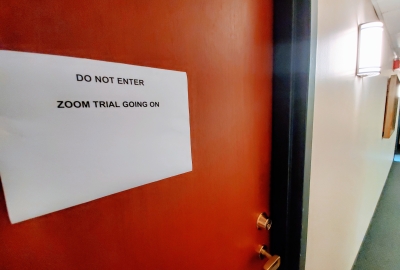Lessons from One of Massachusetts’ First Zoom-Based Civil Trials
Between August 10 and 13, 2020, with the assistance of Nathaniel Donoghue, I tried the case of Bickford’s v. Waltham Ventures, ESCV 1577CV01533-C in the Essex County Superior Court. Normally, that would not be newsworthy—as trial lawyers, that is what we do. But this trial was different—it was conducted remotely via the videoconferencing app, Zoom.

On June 24, 2020 the Supreme Judicial Court had issued a procedural COVID-19 Order permitting the resumption of civil jury waived trials effective August 10, 2020. This case had previously been scheduled for that day. It was the first civil trial conducted via Zoom in the Essex County Superior Court and perhaps the first such civil trial in the Commonwealth.
In January 2018, we had prevailed on behalf of our client Bickford’s on cross motions for summary judgment, resulting in Bickford’s being awarded $170,000 plus interest and in excess of $40,000 in attorney’s fees on its breach of contract claim against Waltham Ventures. Bickford’s had also claimed that in breaching the contract, Waltham Ventures committed unfair and deceptive conduct in violation of Chapter 93A, the Massachusetts unfair trade practices statute. That claim, in which Bickford’s sought to double or triple its damages award, was not resolved on summary judgment and was the subject of the Zoom trial.
Before the trial started, counsel and the Court worked together to ensure that there would not be any issues with the exhibits. The judge, the clerk, each lawyer, and every potential witness had their own set of the 41 agreed upon exhibits and the 8 contested exhibits. Some, including the judge, wanted them electronically while others requested paper binders.
The first day of the trial was devoted entirely to technical issues. The judge made sure that all of the lawyers and potential witnesses were able to log in to Zoom and that he could see and hear everyone.
After that the trial progressed almost like any other jury waived trial. But as with any videoconference there were the occasional freezes and lost connections. We did find that most connection issues were resolved when the participants used Zoom only for video and a phone for their audio connection.
Trying cases remotely presents some logistical hurdles that lawyers should think about and prepare for. For example, during an in-person trial a lawyer could show a witness a document that might not be in evidence to impeach the witness’ testimony or refresh their recollection. With all parties participating remotely, we had to seek permission from the judge to use the share screen feature to show a witness a document outside of the pre-marked exhibits.
The lawyer asking questions needs to decide who he or she wants to be able to see. Is it more important to pin only the witness’ window to see their face more clearly, or to use gallery view to also watch the judge and other lawyers? Our judge pinned the witnesses which meant that he didn’t always immediately see or hear lawyers’ objections. While some objections may have been missed, we were able to adjust to this and it ultimately was not a problem.
The biggest difference from an in-person trial is the loss of personal interaction during the trial. You are limited to communicating with your own witnesses via phone, Zoom, or email. There is no interaction with the other side at all. This means that the conversations between counsel that could lead to resolution do not happen.
For those of you wondering how things turned out, we don’t know yet. Post trial filings are due in September, and then we will have the opportunity to make our closing arguments—via Zoom, of course.
Disclaimer: This summary is provided for educational and informational purposes only and is not legal advice. Any specific questions about this topic should be directed to attorney Jeffrey Loeb.


